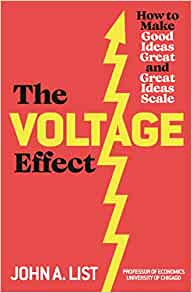I was a bit sceptical about John List’s The Voltage Effect: How to Make Good Ideas Great and Great Ideas Scale mainly because of its presentation as a how-to business book. This goes right through to the design, which would sit nicely in an airport bookstore (remember those?….) But my fears were groundless. It’s a terrific read, and despite the business gloss is full of good advice for all kinds of public and non-profit organisations too.
For those not familiar with his work, List runs field experiments and has done so across a huge range of organisations and contexts, testing behavioural hypotheses. He has also worked as chief economist for Uber and Lyft and so has hands-on experience of how businesses operate, a rare qualification among academic economists. The book clearly draws on this trove of experience, ranging from fishing villages in Brazil to primary schools in Chicago Heights to creating incentive programmes for Lyft drivers and riders. I don’t know Prof List but I admire any economist who has spent so much time out in the ‘real world’.
The book has two halves, the first covering five diagnostics to help assess whether an idea that works at small scale will scale up – whether that’s a policy to assist progress among toddlers in deprived areas to a new digital wellbeing app. The diagnostics boil down to some basic (but evidently challenging) statistical and economic analysis – for example, do you have a representative sample when you test an idea, can you identify false positive results, do you have economies of scale to capture or will costs go up with revenues? The second half is more general econ/business advice – sunk costs are sunk, risk compensation and other behavioural responses are a thing, focus on allocating marginal effort and identifying marginal revenues. I was particularly struck by the last point in the context of cost benefit analysis, List having also spent some time as an economist responsible for CBA in the George W Bush administration in 2002-3.
All in all, this doesn’t topple Shapiro and Varian’s Information Rules from my number 1 position as best ever business book (written by economists), or indeed Dixit and Nalebuff’s The Art of Strategy from number 2, but The Voltage Effect is definitely in the top handful and well worth a read by anbody who wants their organisation to succeed and grow.


Pingback: Book Bits: 19 February 2022 | The Capital Spectator